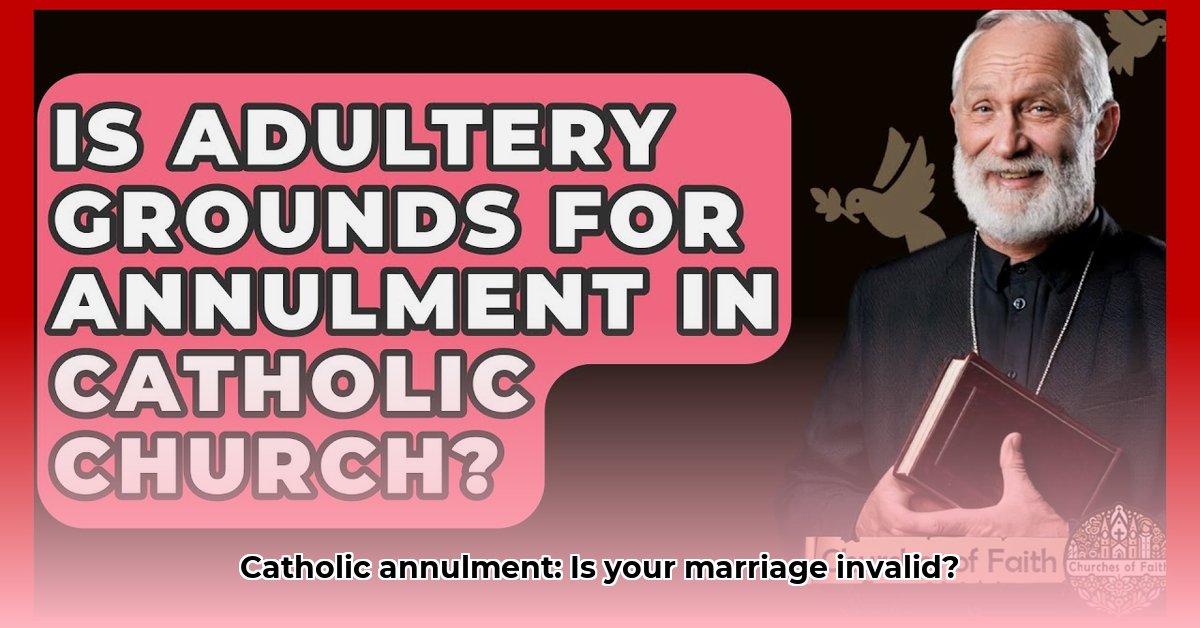
Understanding Catholic annulments can feel overwhelming, but this guide breaks down the process into manageable steps. We'll explore what constitutes a valid Catholic marriage, examine common reasons for seeking an annulment, and provide a clear path forward. Remember, this is a complex legal and religious process, so seeking advice from a canon lawyer is crucial.
What is a Catholic Annulment?
Unlike a divorce, which dissolves a valid marriage, a Catholic annulment (declaration of nullity) declares that a marriage was invalid from the beginning – never truly sacramental in the eyes of the Church. This means the Church considers the marriage to have never existed, not that it was ended.
Three Pillars of a Valid Catholic Marriage
A valid Catholic marriage rests on three essential pillars:
Capacity: Both parties must possess the legal and mental capacity to enter into marriage. This includes being of age, mentally competent, and free to marry (not already married).
Consent: Both individuals must freely and fully consent to the marriage, understanding its lifelong commitment, faithfulness, and openness to children. This is the most crucial aspect.
Form: The marriage must be celebrated according to established Church regulations, typically involving a properly authorized officiant (priest or deacon) and witnesses.
Even a deficiency in one of these areas could potentially invalidate the marriage.
Common Grounds for Annulment
Annulment cases often hinge on demonstrating a lack of capacity or consent. Here's a closer look:
Capacity Issues
Immaturity: Were either party too young or emotionally immature to fully grasp the commitment of marriage?
Mental Illness: Did a significant mental illness or condition impair one or both parties' understanding of the marriage vows?
Pre-existing Marriage: Was one partner already legally married? This automatically renders the subsequent marriage invalid.
Consent Issues: The Heart of the Matter
This is often the most complex area. Did both partners truly and fully understand and willingly agree to:
- Permanence: A lifelong commitment, not a trial period.
- Faithfulness: Exclusive fidelity and commitment to one another.
- Openness to Children: A willingness to embrace the possibility of children (doesn't require having children, but a willingness to.)
Lack of genuine consent can arise from:
Coercion or Duress: Was either party forced or unduly pressured into the marriage?
Fraud: Was there significant deception or withholding of crucial information (e.g., infidelity, addiction) that impacted the other party's consent?
Conditional Consent: Did one party enter the marriage with conditions that were never met? "I'll marry you only if you change your job."
Lack of Intention: Did one party secretly lack the intention to fully commit to the marriage?
Form Issues (Less Common)
Unauthorized Officiant: Was the ceremony performed by someone not authorized by the Church?
Insufficient Witnesses: Were there not enough legally valid witnesses present?
Gathering Evidence for Your Case
A successful annulment depends heavily on the evidence presented. This might include:
Witness Testimony: Statements from individuals who witnessed events supporting the claim of invalidity.
Correspondence: Letters, emails, or other communications that might illustrate the circumstances.
Medical Records: Documentation concerning mental health or other relevant medical conditions.
Psychological Evaluations: Expert opinions addressing mental capacity or psychological issues.
The goal is to demonstrate that one of the essential elements of a valid marriage was missing at the time of the wedding.
Navigating the Annulment Process: The Role of a Canon Lawyer
This is where expert guidance is essential. A canon lawyer specializes in Church law and can guide you through every stage, expertly preparing your case and representing you before the tribunal. They'll help you gather the necessary evidence and present it effectively. Don't attempt this process alone.
Did you know? A skilled canon lawyer can significantly increase your chances of a successful outcome.
Frequently Asked Questions (FAQs)
How long does the process take? The duration varies significantly, depending on the specifics of each case and the tribunal's workload.
How much does it cost? Costs vary; consult a canon lawyer for an estimate.
What if my ex-spouse opposes the annulment? You can still pursue it; your evidence and testimony will be carefully considered.
This guide offers a foundational understanding. Always consult with a canon lawyer for personalized advice tailored to your specific situation. The annulment process can be emotionally challenging, but it can ultimately bring clarity and peace.
Key takeaway: Proving a lack of consent in a Catholic annulment necessitates clear, compelling evidence demonstrating the absence of a key element at the time of the marriage. A canon lawyer is indispensable for navigating the legal and religious intricacies.